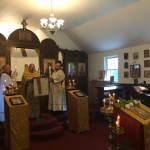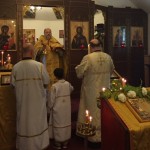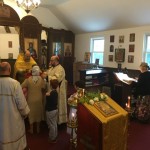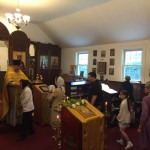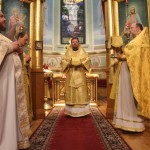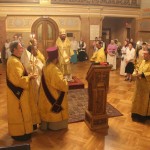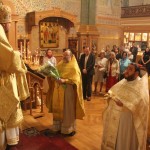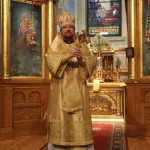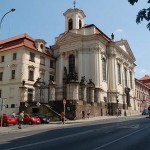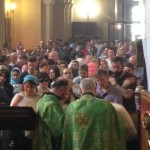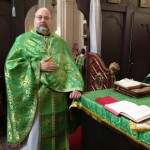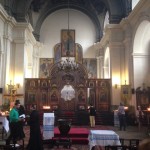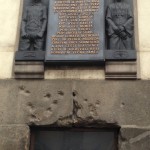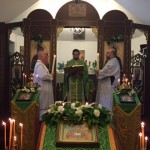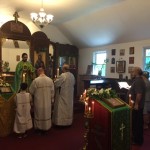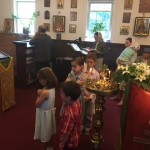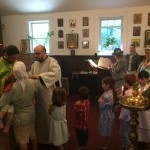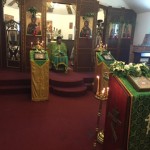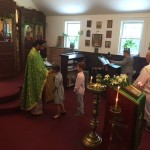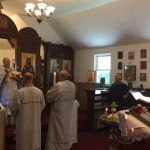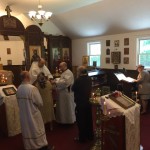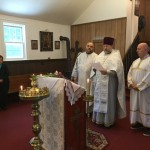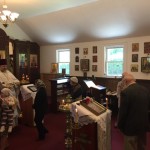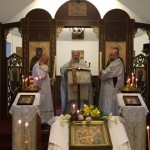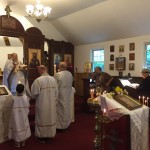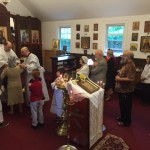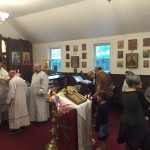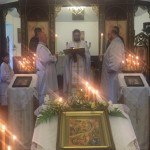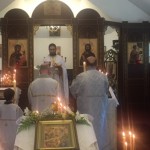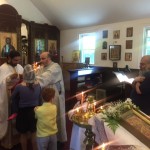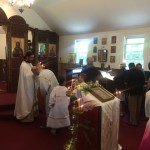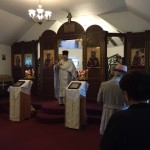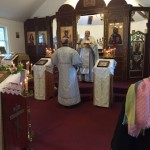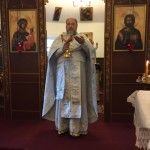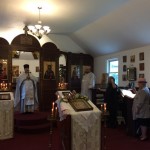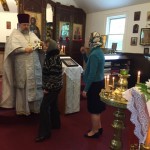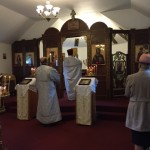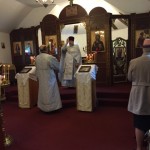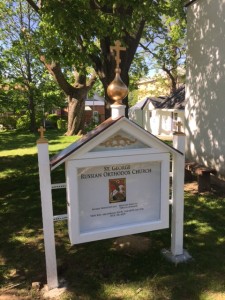On July 3, on the 2nd Sunday after Pentecost, dedicated to All the Saints of the Lands of Rus’, St. George Rector, Archpriest Igor Tarasov served the Divine Liturgy in our temple. Following the Gospel lesson he preached a homily in Russian. An English translation of that homily is as follows:
“Today’s Sunday is dedicated to all the Saints of the Lands of Rus’. It is the end of our continuous celebration of the history of salvation. During our Paschal cycle of celebrations we commemorated our Lord’s Holy Passions, His death on the cross, His glorious Resurrection from the dead. After 40 days of celebrating the joy of Christ Resurrection we came to the feast of His Ascension. And in 10 days after that we solemnly celebrated Pentecost, the Descent of the Holy Spirit. Thus, today’s feast is the result of all that has gone before it. Last Sunday the Church honored All the Saints who lived in the whole world. And today we commemorate those holy men and women who pleased God being members of our local Orthodox Church, the Church of Rus’. The purpose of all the events in Christ’s life is to make Saints, to make people holy. Today’s holy day is the feast of the identity of the Russian Church, of Her sacred personality. For a Church that does not make Saints is not a Church, it is merely an institution which abuses the word ‘Church’.”
“What is a Saint? First of all, we should understand that Saints are not born, they become them during their lives. We are all born potentially to become Saints. The only difference between the Saints and other people, is that the Saints are those who are continually picking themselves up after sinning, continually repenting until they attain holiness, while others give up.”
“We should also say that there are different kinds of Saints. For instance, there are Martyrs, holy Hierarchs, Venerable Fathers and Mothers, faithful Rulers, the Fools for Christ sake, and some others. It is so because here are different personalities of the people. Due to the divine Providence, as well as because of the different personalities and different talents of the people, as well as because of the different circumstances of people’s lives, the Saints differ by their endeavors. Especially, we know the holy Martyrs. And our Russian Church has a lot of them. The number of our Martyrs increased lately because of the fierce persecutions of the Church by the Communists in the 20th century.”
“However, in our time, in our land, as well as in our old country, it would seem that we are not called to be Martyrs, but Confessors. This is another kind of Saints. These are the people who suppose to live a Christian life, to be righteous, and to be an example for others. And at the time of persecutions they should be ready to become Martyrs. They should openly confess the Lord Jesus Christ. To that kind of holiness we are called in our times when the society becomes more and more remote from the Christian faith and Christian ideals. Our present day rulers, especially in the Western world, are very often like Julian the Apostate, they are the apostates from Christian faith. Thus we should become ready to confess Christ before them.”
“But even in our old countries, the rulers are not always adhering to the faith of Christ. For instance, some concern was recently raised because of the new law enacted in Russia. That law substantially limits missionary activity, mostly reduces it to the places of worship. This may cause many problems to any Christian person who would preach his or her faith to anyone else. Some Orthodox Christians already wrote to the Russian President asking him to veto that law. However, it is sad to note that no Orthodox Bishop in Russia said anything regarding that law directed against religious freedom. In any case, we should always remember that the Church will always prevail and endure all the tribulations and persecutions. And we, as the members of the Church have to be ready to confess our Lord before this generation.”
“We may conclude our reflection upon the Saints by saying that all of us, Orthodox Christians are called to become Saints. And we, dear brothers and sisters, are called to become the Russian Saints. In order to accomplish this we need to constantly repent our sins and to avoid staying in our sins and iniquities. We may finish this reflection by listening and fulfilling the command of the Holy Apostle Paul who is uttering to us the following words of today’s Epistle reading, “Therefore we also, since we are surrounded by so great a cloud of witnesses, let us lay aside every weight, and the sin which so easily ensnares us, and let us run with endurance the race that is set before us, looking unto Jesus, the author and finisher of our faith” (Heb. 12, 1-2).”
Following the dismissal of the Liturgy the Rector preached a short sermon in English conveying the main ideas of his Russian homily.

